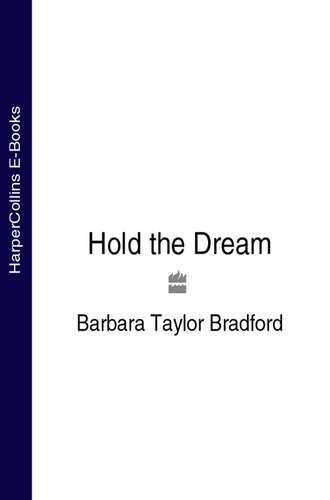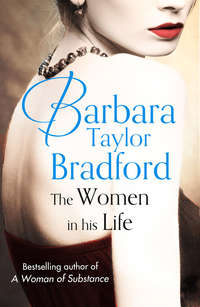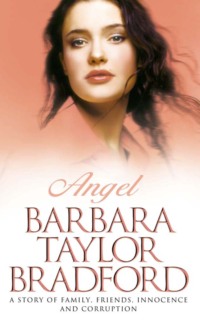
Полная версия
Hold the Dream
Emma closed her eyes. Paul would have been as proud of Paula as she was, for the girl had all the qualities he had most admired: Honour, integrity, honesty, fairness and an intelligence that frequently startled with its brilliance. Although she had gentle manners, and was inclined to shyness, Paula possessed a certain cool poise, and she had inherited her grandfather’s great sense of fun, as had Daisy. Yes, she’s a McGill all right, Emma remarked under her breath. But she’s a Harte as well. Thank God she has my toughness and astuteness, my indomitability and stamina. She’s going to need all of those in the years to come, with what I’m leaving her, with what she has inherited from her grandfather. I hope she never thinks of her inheritance as a terrible burden. It is an enormous responsibility, of course …
Baby Tessa started to shriek, her piercing wails echoing throughout the church. Emma opened her eyes and blinked. She leaned forward, peered at the scene at the font. Everyone wore expressions of concern. The vicar was holding the baby, sprinkling the holy water on her forehead, christening her now in the name of the Father, the Son and the Holy Ghost. When he had finished he handed the child back to Emily, obviously with some relief. Emily began to rock her, trying to calm and soothe the infant to no avail.
Emma chuckled quietly, knowing it was the shock of the cold water on her forehead which had made Tessa cry. The child was protesting – and most vociferously. I can see it already, she thought, little Tessa McGill Harte Fairley is going to be the rebellious one in that family.
Daisy, also smiling, took hold of her mother’s arm and squeezed it. She whispered, ‘It sounds to me as if Tessa is a chip off the old block, Mummy.’
Emma turned her head to look into her favourite daughter’s wide clear blue eyes. ‘Yes,’ Emma whispered back, ‘she’s always been the livelier of the two. Another maverick in the brood?’ She arched a silver brow most eloquently. Daisy simply nodded in answer, her fine eyes dancing with happiness and some amusement.
Within minutes the ceremony was over and they were slowly filing up the aisle. Emma, her arm tucked through Blackie’s, smiled and nodded graciously, but she did not pause to speak to anyone.
Before long the entire family, their friends and the villagers were assembled on the porch, congratulating the parents and chatting amongst themselves.
Several of the local residents came up to Emma, stood talking to her for a few minutes, but very shortly she excused herself and drew Blackie away from the crowd. She said, ‘I’ll slip away now and I’ll be back before anyone notices my absence. Then we can get off to Pennistone Royal.’
‘All right, Emma. Are you sure I can’t go with you?’
‘No. But thanks anyway, Blackie. I won’t be a minute.’
As Emma edged away from the busy porch, Milson, Blackie’s chauffeur, hurried towards her carrying a basket of flowers. She took it from him, smiled, and murmured her thanks.
She went through the lych-gate leading into the graveyard adjoining the church.
Her feet knew the way by heart, and they led her down the flagged path to the far corner, a bit secluded and bosky and shaded by an old elm tree growing by the side of the moss-covered stone wall. Lying in that corner, beneath the headstones she herself had chosen years before, were her parents, John and Elizabeth Harte. Next to them were her two brothers, Winston and Frank. She took bunches of flowers from the basket and placed one on each of the four graves. Straightening up, she rested her hand on her mother’s headstone and stared out towards the bleak moors, a smudged dark line against the periwinkle blue sky filled with scudding white clouds and intermittent sunshine. It was a lovely day, surprisingly warm, balmy even, after the thunderstorms of yesterday. A perfect day to go climbing to the Top of the World. She strained her eyes, but that spot was too far away in the distance to see, and obscured by the soaring fells. She sighed, remembering. Her eyes swept from headstone to headstone, name to name. I’ve carried each one of you in my heart all the days of my life, she said silently. I’ve never forgotten any of you. Then unexpectedly the queerest thought entered her mind – she would not be coming back here again to visit these graves.
Emma turned away at last.
Her steps carried her along the same flagged path that curved through the cemetery, and she did not stop until she reached a wide plot of ground at the other side, in the gloomy shadows of the church. This large private plot was encircled by iron railings which set it apart, told everyone that it was special and exclusive. She pushed open the small gate and found herself amongst generations of Fairleys. She glanced at the graves, and finally her eyes came to rest on Adam Fairley’s headstone made of white marble. On either side of him were his two wives – Adele, the first, and Olivia, the second. Those two beautiful sisters who had loved and married the same man, and who had, in their own ways, been good to her when she had been a young girl. She had never forgotten their kindness to her, but it was on the middle grave that her gaze lingered for a moment longer.
Well, Adam Fairley, she thought, I won. In the end it was I who triumphed. There is nothing left that your family owns in the village, except this plot of land where you are buried. Everything else belongs to me, and even the church operates mostly through my largesse. Your great-great-grandchildren have just been christened and they bear both of our names, but it is from me that they will inherit great wealth and power and position. These thoughts were not rancorous, ran through her mind in a matter-of-fact way, for she had lost all hatred for the Fairleys, and it was not in her nature to gloat, especially when standing next to a man’s last resting place.
Slowly she walked back to the church, and the smile on her serene face was one of gentleness and peace.
Coming through the lych-gate, Emma saw Blackie standing to one side, away from the large group of people, talking to her two youngest grandchildren, Amanda and Francesca.
Blackie chuckled as she came to a standstill by his side. ‘You might know these two would see you do your disappearing act! I had to forcibly restrain them from running after you. Well, almost.’
‘We wanted to look at the graves, too, Grandy,’ Amanda explained. ‘We love cemeteries.’
Emma gave her a look of mock horror. ‘How morbid.’
‘No, it isn’t, it’s interesting,’ Francesca chirped up. ‘We like to read the tombstones, and we try to guess what the people were like, what kind of lives they led. It’s like reading a book.’
‘Is it now.’ Emma laughed, and the look she gave the fifteen-year-old was affectionate. ‘I think we should go back to the house,’ Emma continued. ‘Did Emily tell you we’re having a champagne tea this afternoon?’
‘Yes, but she said we couldn’t have any champagne. We can, though, can’t we, Gran?’ Amanda asked.
‘Just one glass each, I don’t want you both getting tiddly.’
‘Oh thank you, Gran,’ Amanda said, and Francesca linked her arm in Emma’s, and announced, ‘We’ll come with you. Uncle Blackie’s car is much nicer than Emily’s old Jag.’
‘That’s not a very nice attitude, Francesca. You came with Emily, and you will drive back with her. Besides, Uncle Blackie and I have things to discuss.’
But they did not really have anything very special or important to talk about. Emma simply wanted to be alone with her dear old friend, to relax before the reception, to catch her breath before she was engulfed by her large and unorthodox clan.
At one point, as they were driving along, Blackie looked at her and said, ‘It was a grand christening, Emma. Very beautiful. But you had such a strange look on your face when the vicar was baptizing Lorne, I couldn’t help wondering what was going through your mind.’
Emma half turned to face him. ‘I was thinking about another christening … the one you performed when you baptized Edwina with Armley tap water in Laura’s kitchen sink.’ Her eyes held his for the longest moment. ‘I couldn’t help dwelling on the past. You know, Edwin Fairley wouldn’t have been permitted to marry me when I was pregnant, even if he had wanted to, and so Edwina could never have been christened here at Fairley. That really struck home today.’
‘Yes,’ he said in agreement, ‘it would have been denied her, no matter what.’
Emma nodded. ‘And so, as I thought of everything that has gone before in my long life, it suddenly occurred to me that this occasion today was a most compelling example of ironic reversal. And that Adam Fairley, more than anyone else, would have appreciated the poetic justice of it all.’
She paused, smiled faintly. ‘The wheel of fortune truly has come full circle.’
CHAPTER 11
Jim Fairley, orphaned at the age of ten and raised by his widowed grandfather, had always been lonely as a child.
In consequence, he thoroughly enjoyed being a part of Emma Harte’s huge family, one which had become his own when he married Paula in 1968. In a way, being flung head first into this extraordinary clan was something of a novelty to him; also, as yet, he remained unscathed by them and thus had kept an open mind about their individual characters, had not attempted to do a tally of their attributes or their faults. And he had held himself apart from the complex animosities and alliances, feuds and friendships that flourished around Emma.
Because Jim rarely thought ill of anyone, he was frequently startled when Paula came down hard on one of her aunts or uncles, and at times he even wondered if she exaggerated when she listed their imperfections, the terrible wrongs they had done her grandmother. But then she was fiercely protective of her beloved Grandy, whom she doted on. Jim was secretly amused by his wife’s attitude, since he believed no one was better equipped to take care of herself than Emma Harte.
A short while ago Jim had decided that Paula’s warnings about the Countess of Dunvale were written in water. So far this weekend Edwina had behaved impeccably – as he had fully expected she would. If she was somewhat reserved with Paula she was at least civil, and he had even managed to make Edwina laugh on their way back from church. She was still in an amiable mood, as he could now see.
His aunt was chatting with her son, Anthony, and Sally Harte, near the fireplace and her usually stiff, tight-lipped expression had all but vanished. For once she appeared to be relatively at ease. Poor old thing, she’s not so bad, he thought, as always charitable about others, and swung his eyes to the painting to Edwina’s left. This hung over the white marble fireplace and it was one of his favourites.
Jim stood at the entrance to the Peach Drawing Room. Pennistone Royal, that lovely mixture of Renaissance and Jacobean design, boasted two formal reception rooms. Paula had chosen this one for the christening party.
He was glad that she had.
He thought it was the loveliest spot in the entire house, with its cream and peach colour scheme and exquisite paintings. Although Emma had depleted her renowned collection of Impressionists by selling some of them off last year, she had retained the two Monets and the three Sisleys that graced these walls. In his opinion it was the works of art that gave the tranquil and elegant Regency room its great beauty.
Jim gazed at the Sisley for a second or two longer, admiring it from this vantage point. He had never coveted anything material in his whole life, but he longed to own this painting. Of course he never would. It would always hang in this house, as Emma had decreed in her will. One day it would be Paula’s property, and therefore he would never be deprived of it, could gaze at the landscape whenever he wished. That was why his intense desire for personal possession of it constantly startled him. He had never felt so strongly about anything, except perhaps his wife. His eyes sought Paula without success. The room had filled up during the ten minutes he had been absent with the photographer, who was setting up his equipment in the Grey Drawing Room. It was just possible she was hidden from view.
He went in rapidly.
At six foot one, well built but trim of figure and with long legs, James Arthur Fairley cut quite a swathe, especially since he was something of a clothes horse, was never anything but faultlessly dressed right down to his handmade shoes. Like his great-grandfather before him, he had a weakness for elegant clothes and a penchant for wearing them with a bit of a dash. Fair of colouring, with light brown hair, he had a pleasant rather sensitive face and soulful greyish-blue eyes. Born and bred a gentleman, he had a natural self-confidence and handled himself easily, and with aplomb, in any given situation. He had a certain quiet charm and a ready smile for everyone.
This flashed as he strode into the centre of the room, glanced about, looking for Paula.
Since he could not find her he took a glass of champagne from a passing waiter, and made a move in his father-in-law’s direction. Edwina spotted him and hurried over, cutting him off before he reached David Amory. She at once launched into a rave about the church ceremony, and then engaged him in a conversation that centred on Fairley village. As he listened patiently, Jim realized yet again, and with a recurrence of his initial surprise, that being a Fairley was of tremendous importance to her. Ever since their first meeting, she had continued to ply him with questions about his grandfather, his grandmother and her father, the long-dead Earl of Carlesmoor, and was inquisitive about his own parents who had been tragically killed in a plane crash in 1948.
On the various occasions he had been with his half-great-aunt, for that was what she actually was, he had detected a sense of embarrassment in her because of her illegitimacy, and he had always felt slightly sorry for her. This was one of the reasons he tried to be kind, to include her in those family celebrations about which he had something to say. His mother-in-law had a nice way with Edwina, but apart from this, Jim recognized that Edwina was drawn to Daisy because they had both been born on the wrong side of the blanket. Emma’s first child strongly identified with her youngest because of this similarity in their births. But their illegitimacy was the only thing they had in common. The two women were the antithesis of each other. His mother-in-law had the sweetest nature, was a compassionate and considerate woman, and a lady in the truest sense of that word. There was no ‘side’ to Daisy Amory, and he liked her for her relaxed attitude towards life, her gaiety and her sense of humour. Sadly, his Aunt Edwina was inflexible and sour, tense and standoffish, a dyed-in-the-wool snob, whose basic values were quite alien to him. Yet there was something indefinable in her that touched him, filled him with a curious sympathy for her. Perhaps this was because they shared the same blood. Paula constantly said that blood was not thicker than water, but he tended to disagree. He was sure of one thing. His relationship with Edwina, slender and tenuous though it was, annoyed Paula to the point of anger. He found this to be most unreasonable on her part, and he fervently wished she could be less emotional about his aunt. In his opinion, Edwina was a harmless old lady.
‘I’m so sorry, Aunt Edwina, I missed that,’ Jim said with an apologetic smile, giving her his undivided attention again.
‘I was saying that it was a pity my mother had Fairley Hall torn down.’ Edwina gave him a long and careful look through her narrowed silvery eyes. ‘The house was very old, and by rights it really ought to have been preserved as a landmark in Yorkshire. And just think, if it were still standing, you could have lived there with Paula.’
Jim missed the inherent criticism of her mother in these words. He laughed and shook his head. ‘I don’t think so. I didn’t like the look of Fairley Hall from the photographs I’ve seen. According to Grandfather it was a hodgepodge of architectural styles and a bit of a monstrosity. He never liked it himself, and personally I think Grandy did the right thing.’
Daisy, who had been hovering close by, caught the tail end of their conversation, and exclaimed, ‘I second that, Jim. Besides, Mother put the land it stood on to very good use, by turning it into a park for the villagers. It’s a charming spot for them during the warm weather. It was very generous of her.’ She glanced across at the Vicar of Fairley who was talking to her husband, and explained, ‘And the reason Reverend Huntley is beaming right now is because Mother has just given him a large cheque for the church restoration fund. She keeps that village going in more ways than one.’ Having rebutted Edwina, squelched her in the pleasantest way, Daisy gave her half-sister a warm smile. ‘I haven’t complimented you, Edwina dear. You look lovely, and that’s a very smart suit you’re wearing.’
‘Oh,’ Edwina said, startled by these kind words. She hardly ever received compliments, and she preened a little, and a sparkle entered her pale eyes as she automatically reached up and patted her hair. Then remembering her manners, she rushed on, ‘Thank you very much, Daisy. You look beautiful yourself, but then you always do. As for my suit, it’s by Hardy Amies. I wasn’t sure it was right for me, but he persuaded me it was.’
The two women discussed clothes for a few seconds, then Daisy exclaimed, ‘You’ll have to excuse me, I’m afraid. I can see Mother trying to catch my eye.’
Left alone with Jim again, Edwina began to enumerate the delights of her home in Ireland. ‘I do wish you could see Clonloughlin at this time of year, Jim. It’s perfectly beautiful, everything’s so green. Why don’t you and Paula make plans to come over for a weekend soon? You’ve never seen it, and we’d love to have you. It’s only a hop, skip and a jump in that plane of yours.’
‘Thank you, Edwina, perhaps we will.’ As he spoke Jim knew Paula would never agree. He decided to cover himself, added, ‘However, I don’t think I’ll be able to drag her away from the babies for some time yet.’
‘Yes, I do understand,’ Edwina murmured, wondering if she had been rebuffed, and to cover her confusion, she went on talking nonstop.
Jim, listening politely and trying to be attentive, wished he could make his escape. Because of his height he towered above Edwina, who was quite small, and now he glanced over her silvery blonde head, looking around, wondering what had happened to Paula. Most of their guests had arrived. She was noticeably absent.
Sarah Lowther had just walked in on the arm of her cousin, Jonathan Ainsley. Bryan and Geraldine O’Neill were talking to Alexander Barkstone and his girlfriend. Blackie was standing by the window, engaged in an animated conversation with Randolph Harte, and he appeared to be excited about something, was beckoning to his granddaughter. Miranda floated over to join them, a vision in one of her crazy costumes, her freckled face brimming with laughter, her bright auburn hair gleaming like a copper helmet in the sunshine pouring through the tall windows.
Jim shifted slightly on his feet, surveying the room at large. Emma was perched on the arm of a sofa, being attentive to her brothers’ widows, Charlotte and Natalie. These two genteel-looking ladies gave the impression of frailty and great age in comparison to Emma, who exuded vitality and happiness this afternoon. He studied her face for a moment. He had revered and respected this remarkable woman all the years he had worked for her; since his marriage to her granddaughter he had come to know a different side of her, had grown to love her. Emma had such an understanding heart, was kind and generous, and the most fair minded person he had ever met. What a fool his grandfather had been to let her escape. But he supposed things were difficult in those days. Stupid class differences, he thought, and sighed under his breath. Then, quite suddenly, he wished that Edwin Fairley had lived long enough to witness this day … to see the Fairleys and the Hartes united at last through matrimony. Their blood was mingled now. He and Paula had started a new blood line.
He became aware that Edwina had stopped her ceaseless chattering and was staring up at him. He said quickly, ‘Let me give you a refill, Aunt Edwina, then I think I’d better go and look for Paula. I can’t imagine what’s happened to her.’
‘No more champagne at the moment, thank you, Jim,’ Edwina said with the faintest of smiles. She was determined to remain cool and collected and keep a clear head this afternoon. Too much wine would have an adverse effect on her, make her lose her self-possession. That she could not afford. She said, ‘Before you disappear, there is one thing I’d like to ask of you. I’ve been wondering if you would be kind enough to invite me to your house in Harrogate. I know it belonged to your grandfather.’ She hesitated, nervously cleared her throat, finished, ‘I’d love to see where he … where my father lived for so many years of his life.’
‘Of course, you must come over for drinks,’ Jim said, understanding this need in her. He hoped Paula would not fly into one of her tempers when he told her he had acquiesced to his aunt’s request. He began to edge away when Emily, with Amanda and Francesca in tow, breezed up to them, cutting off his escape route.
Smiling brightly, Emily grabbed his arm, glanced at Edwina and cried, ‘Hello, you two. Isn’t this the most amazing bun fight. I think it’s going to be a super party.’
Jim smiled at her indulgently. He was extremely fond of young Emily. ‘Have you seen my wife anywhere?’ he asked.
‘She went upstairs with the nursemaid and the babies, muttering something about changing them. I guess they wet themselves rather thoroughly.’ Emily giggled and rolled her eyes in an exaggerated fashion. ‘Just be glad they didn’t get that elegant Kilgour and French suit of yours drenched with their wee w–’
‘Really, Emily,’ Edwina sniffed reprovingly, ‘don’t be so vulgar.’ She gave her niece a cold and disapproving look.
Emily, blithely unconcerned, giggled again. ‘Babies do do that, you know. They’re like puppies. They can’t control their bladders. And I wasn’t being vulgar, Aunt Edwina, merely stating a fact of life.’
Jim could not resist laughing, recognizing that Emily was purposely being provocative. He threw her a warning frown, glanced at his aunt, praying she would not pounce on Emily.
Edwina was obviously annoyed. Fortunately, before she could think of a suitably chilly response, Winston hove in view, made a beeline for them, greeted everyone and positioned himself between Emily and Amanda.
He turned to Jim, and said, ‘Sorry to bring up business on such a festive occasion, but I’m afraid I have no alternative. I’d like to get together with you first thing on Monday, to discuss a couple of matters. Will you have time to see me?’
‘Of course,’ Jim said, giving Winston a puzzled look. Concern edged into his eyes and he frowned. ‘Anything serious?’
‘No, no, and the only reason I mentioned it now was to make sure you’d keep an hour free for me. I have to go to Doncaster and Sheffield that day, and the rest of the week is impossible. I’m really jammed.’
‘Then let’s make a definite date, Winston. Say about ten-thirty? I’ll have the first edition out on the streets by then.’
‘That’s fine,’ said Winston.
With this matter settled, Jim said, ‘Your father seems very pleased with himself, and so does Blackie. Look at them both. They’re behaving like a couple of kids with a new toy. What’s all the excitement about?’
Winston glanced over his shoulder and laughed. ‘My father wants to run Emerald Bow in the National next year, and Blackie’s tickled to death about it. I think Aunt Emma’s just as thrilled.’
‘So I can see,’ Jim said.
‘Gosh, what marvellous news, Winston,’ Emily exclaimed.
‘I hope Grandma invites us all to go to Aintree next March.’ The conversation now centred around the Grand National and the possibility of Emerald Bow winning the steeplechase. All kinds of opinions were voiced, and even the fifteen-year-old twins had something to say.







